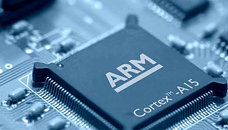- Joined
- Oct 9, 2007
- Messages
- 47,895 (7.38/day)
- Location
- Dublin, Ireland
| System Name | RBMK-1000 |
|---|---|
| Processor | AMD Ryzen 7 5700G |
| Motherboard | Gigabyte B550 AORUS Elite V2 |
| Cooling | DeepCool Gammax L240 V2 |
| Memory | 2x 16GB DDR4-3200 |
| Video Card(s) | Galax RTX 4070 Ti EX |
| Storage | Samsung 990 1TB |
| Display(s) | BenQ 1440p 60 Hz 27-inch |
| Case | Corsair Carbide 100R |
| Audio Device(s) | ASUS SupremeFX S1220A |
| Power Supply | Cooler Master MWE Gold 650W |
| Mouse | ASUS ROG Strix Impact |
| Keyboard | Gamdias Hermes E2 |
| Software | Windows 11 Pro |
SoftBank today announced that it has concluded the acquisition of British chipmaker ARM, in a USD $31 billion purchase. The acquisition was first announced in July 2016. Following this, ARM will be de-listed from the London Stock Exchange from the 6th of September 2016. Although ARM is a CPU architecture designer with a mere $1.5 billion in revenue last fiscal, and licenses the architecture to other SoC makers such as Qualcomm, Samsung, Apple, Huawei, etc., SoftBank is betting on ARM CPU architecture's emergence as the prime-mover of the IoT (Internet of things) revolution. This is SoftBank's largest tech acquisition following the $20 billion acquisition of American cellular network Sprint, and a $15 billion investment in Vodafone Japan.

View at TechPowerUp Main Site

View at TechPowerUp Main Site




